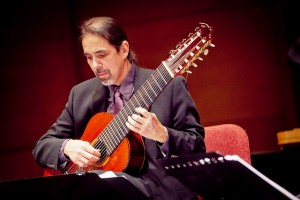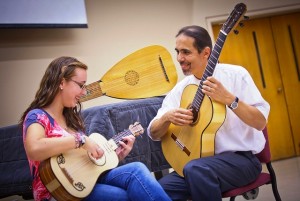Audiences attending a concert by the Marquis Consort shouldn’t be surprised to hear music that may not have been performed for hundreds of years.
The ensemble’s director, Jorge Torres, specializes in 16th and 17th century music, and the Marquis Consort is just one of the vehicles he uses to help students dig inside the music they study.

Jorge Torres, associate professor of music, performs with the Marquis Consort.
With only 8-12 members, the Marquis Consort affords Torres more opportunities to discuss the work with students than he would if he had a 50-member orchestra. The ensemble performs a diverse mix of music repertories ranging from 16th-century Spanish music to traditional Irish music. Torres enjoys the chance to expose the ensemble as well as audiences to an eclectic repertoire. Last semester, it performed a program of Brazilian songs for voice and mixed ensemble.
In choosing the music for the Marquis Consort, Torres not only arranges the music, but tailors the parts to the players each semester. Because the music is from an early period, there often is no modern edition, so Torres also must transcribe it from the old notation into modern notation.
“Early music is exotic,” he says. “It is very foreign and strange sounding when compared to music of the common practice period, like Mozart, Beethoven, and Brahms. It’s like a puzzle trying to figure out the notational systems from the past, recreate them in modern notation for my players in the consort, and bring the music to life in a way that makes the music relevant for today’s audiences.”
For Torres, associate professor of music, his classes aren’t so much about grades as they are about fostering a space for self-reflection and allowing students to learn more about themselves as they learn about the music.
“I want students to be able to approach a piece of music from several perspectives (play it, listen to it, read about it), discover its significance, and learn to posit its significance for others or themselves,” he says. “It is far more important that students learn the meaning of and context behind, for example, the sonata form, rather than just emphasize who wrote it, when the composer lived, and what ‘-ism’ might best be associated with his or her name.”

Jorge Torres works with Shannon Moran ’14.
In addition to working with students in the Marquis Consort and in the classroom, Torres involves students in his research. He recently completed The Greenwood Encyclopedia of Latin American Popular Music, which will be published by Greenwood Press/ABC-CLIO this October. The volume is an encyclopedia of Latin American popular music featuring country profiles, concepts, genres, instruments, and themes important to Latin American music. Three EXCEL Scholars assisted with the organization, research, typing, and editing of the volume. Torres says that without music and philosophy graduate Ray Epstein ’09, English and Spanish graduate Caitlin Lowery ’10, and history major Tracy McFarlan ’13 (Yardley, Pa.), he never would have been able to complete the work.
Not only is Torres a musicologist, he is an accomplished guitarist as well. As an applied guitar instructor, Torres helps students discover their short- and long-term goals. Whether it’s playing a program or simply improving on sight reading, Torres and his students work together to reach the desired outcome. Teaching and conducting are similar pursuits for Torres, a chance for collaboration and growth on the part of student and teacher.
“Working on problems with others makes me a better learner,” says Torres, who earned his Ph.D. in musicology from Cornell University. “I may be leading the research, but the learning is a two-way street. I learn as much from my students as they may from me because we are both searching for the same truths.”


4 Comments
This is a great article. Congratulations on all your hard work Professor Torres!
Thank you…not sure if I was already subscribed. G Werner’59
You’re the man!
Wonderful article Jorge. You are an inspiration. Thank you.
Comments are closed.